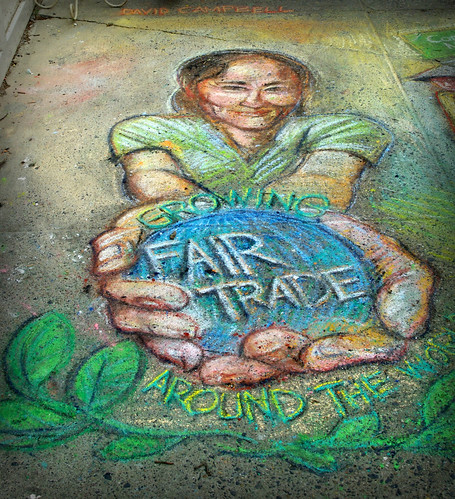Fair-trade Clothes

flickr photo shared by fauxto_digit under a Creative Commons ( BY-ND ) license
Introduction
In 2013, in Bangladesh, the Savar building collapse hit the headlines:an eight-story commercial building collapsed, causing a death toll of 1,129 people. This incident is considered to be the deadliest garment-factory tragedy in history. Bangladesh has one of the cheapest costs of labour in the world – workers, when paid, are only paid $0.23 per hour!
But it is not just Bangladesh. This form of modern-day slavery has become a common sight in many poor countries and it is interwoven in the fabric - so to speak - of our consumer-led western economies. In this process of cheap mass manufacturing in low-cost countries, workers get exploited working 12+ hours under extremely precarious conditions, earning extremely low salaries (if any) and quite often are exposed to hazardous chemicals. But what is particularly disturbing is that we are the ones who feed this exploitative, global supply chain every time we buy a dirt-cheap purse on sale from a Bangladeshi shop, or every time we delight ourselves with a dirt-cheap T-shirt from an Indonesian shop.
People are fleeing their countries as refugees in search of a better future, or rather, in search of a future. Once we start to connect the dots, might our everyday choices actually be among the reasons for these migratory escape routes?
The following activity provides a brief overview of the meaning of Fair Share and consumer power - how we as consumers can do our best to prevent workers from poor treatment and misery.
Activity Type
Group / Experiential
Duration
1 hour
Learning Outcomes
To realize the importance of knowing where the things we purchase come from
To learn about fair-trade production
Instructions
Preparation work
Ask the group to do research on how workers are treated in poor countries as preparation for the next class.
Ask each participant to select one piece of their clothing that comes from another country (preferably from a developing country if they have such clothes). The participants should do research on the workers’ rights in that particular country and could create an A4 or A3 size poster about it that will help them to present their findings.
You can direct them with questions like:
How many hours per day do people work in the garment industry?
What is the average salary in different countries?
What are the working conditions in factories?
Are they provided with health insurance?
Step-by-Step Instructions:
Invite participants to bring to the table the clothes they brought with them and were used as an inspiration for their research.
Based on the size of the group, decide if the group stays together or participants are divided into smaller groups where they hold separate discussions. Each participant in each group presents the piece of clothing they brought and talk about the research they did on the workers' rights in the specific country where that item was manufactured. They can use an A3/A4 poster to present their findings.
Introduce the concept of fair-trade clothes and if possible show participants fair-trade clothes that you brought to the class. Discuss the options of buying fair-share clothes in your area or online.
Resources
Reflection
Do participants see the importance of knowing where our clothes come from?
Do participants see the value of purchasing fair-trade items?
Do participants realise how our daily choices directly affect people in other places of the world?
Instructions for Submission
Submit your written reflection on the activity. Instructions on how to upload photos and how to submit things in Moodle can be found here: Instructions on Submission&Uploading
Instructions for Assessment
Provide feedback to at least one participant that has done this activity. Instructions on providing feedback can be found here: Instructions on Feedback
Related topics
Remember, buying fair-trade clothes is just one way of decreasing our ecological footprint. To explore other even more sustainable options (such as swapping or buying second-hand), please refer to the Free Store and the Bike Pool.